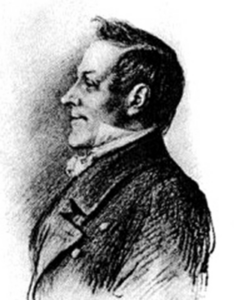The shepherd
(Poet's title: Der Hirt)
Set by Schubert:
D 490
[October 1816]
Du Turm, zu meinem Leide
Ragst du so hoch empor!
Und mahnest grausam immer
An das, was ich verlor.
Sie hängt an einem andern
Und wohnt im Weiler dort.
Mein armes Herz verblutet,
Vom schärfsten Pfeil durchbohrt.
In ihren schönen Augen
War keiner Untreu Spur;
Ich sah der liebe Himmel,
Der Anmut Spiegel nur.
Wohin ich mich nun wende,
Der Turm, er folget mir;
O, sagt’ er, statt der Stunden,
Was mich vernichtet, ihr!
You tower! You aggravate my suffering
By looming up so high,
And you always offer a cruel reminder
Of that which I have lost.
She is attached to someone else
And lives over in that little village.
My poor heart is bleeding,
Pierced by the sharpest of arrows.
In her beautiful eyes
There was not any trace of infidelity;
All I saw was heaven in its loveliness
Reflected in the mirror of her charm.
Wherever I now turn
That tower is following me;
Oh, if only, instead of telling the time, it told
Her what is destroying me!
All translations into English that appear on this website, unless otherwise stated, are by Malcolm Wren. You are free to use them on condition that you acknowledge Malcolm Wren as the translator and schubertsong.uk as the source. Unless otherwise stated, the comments and essays that appear after the texts and translations are by Malcolm Wren and are © Copyright.
☙
Themes and images in this text:
Bows and arrows Castles and towers Clocks Eyes Hearts High, low and deep Heaven, the sky Lost and found Mirrors and reflections Shepherds
It is not immediately clear why the tower looms so large in this shepherd’s thoughts or why it reminds him of his lost love. The most rational explanation seems to be that it is the tower (with a bell or clock which rings the hour) attached to the church where the beloved had got married. Although she is now ‘over there’ living in a tiny hamlet (a settlement without a church), the church is relentlessly present in the shepherd’s consciousness. It continues to strike, wherever he goes. He is struck to the core, as if pierced by an arrow.
He is being destroyed, he says, ‘vernichtet’ (literally ‘turned to nothing’). All that he is aware of is his loss, her absence. The penetrating arrow and the looming tower are the images of his torment. The symbolism here is barely subtle. The tower seems to point up his own deficiency; its hourly performance perhaps points to his emasculation. The other to whom she has become attached must have had more to offer.
☙
Original Spelling and notes on the text Der Hirt Du Thurm! zu meinem Leide Ragst du so hoch empor, Und mahnest grausam immer An das, was ich verlor . Sie hängt an einem Andern, Und wohnt im Weiler dort. Mein armes Herz verblutet, Vom schärfsten Pfeil durchbohrt. In ihren schönen Augen War keiner Untreu Spur; Ich sah der liebe Himmel, Der Anmut Spiegel nur . Wohin ich mich nun wende - Der Thurm, er folget mir; O sagt' er, statt der Stunden, Was mich vernichtet, ihr! 1 When the text was published (in 1824) this line reads 'An sie, die ich verlor' (Of her, whom I have lost). It is impossible to know if Schubert made the change or if he was working from an early draft by Mayrhofer. 2 Published version: 'In ihren braunen Augen' (In her brown eyes) 3 Published version: 'Aus ihnen sprachen Liebe / Und holde Anmuth nur' (From them all that spoke were love and beauteous charm)
Confirmed by Peter Rastl with Gedichte von Johann Mayrhofer. Wien. Bey Friedrich Volke. 1824, page 11.
Note: Schubert received Mayrhofer’s texts generally in manuscript; the printed edition of Mayrhofer’s poems appeared much later and usually presents the texts in a revised version.
To see an early edition of the text, go to page 11 [25 von 212] here: http://digital.onb.ac.at/OnbViewer/viewer.faces?doc=ABO_%2BZ177450902


